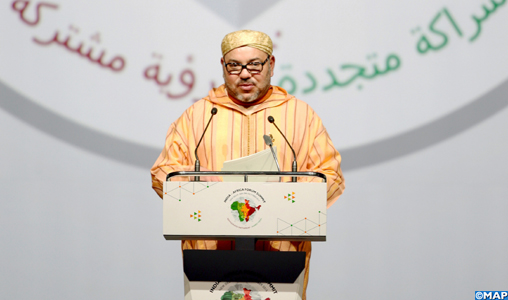Gulf News Report

Dubai: In a speech marking the 40th anniversary of the Green March delivered in November in Laayoune, a major city in the Sahara, the Moroccan monarch was straightforward about the current situation, the days ahead for the region and the development strategy for the people living there.
“Conditions are now ripe for the dawn of a new era in the process to consolidate national unity and achieve full integration of our southern provinces into the motherland,” he said. “The implementation of the Development Model for the Southern Provinces and the application of advanced regionalisation are part of that process.”
For Morocco’s King Mohammad VI, there is not the slightest doubt about the political, economic and social future of the Sahara.
“The implementation of the Development Model for the Southern Provinces shows how committed we are to fulfilling our obligations towards our fellow citizens in these provinces, which will thus become a model of integrated development.”
The aim was clear: “We want this development model to seal these provinces’ integration into the unified homeland and to enhance the influence of the Sahara region as an economic hub and a crucial link between Morocco and its African roots.”
For King Mohammad, who succeeded his father King Hassan II in 1999, the forward-looking movement to fulfill his ambitious vision for the region will continue unabated and he will keep pressing ahead for the provinces of the Sahara to step into modern times and for their residents to benefit from new advantages.
The plans will also contribute to putting an end to the deadlock into which the dispute has been pushed.
“By starting to implement advanced regionalisation and adopting a development model, Morocco wishes to increase the chances of finding a lasting solution to the artificial dispute over our territorial integrity,” he said. “Because it believes its cause is a just one, it reacted positively in 2007 to the call of the international community and came up with proposals to find a way out of the impasse. Therefore, we proposed the Autonomy Initiative for the Southern Provinces, which was judged by the international community to be both serious and credible,” he said.
However, he warned that Morocco while seeking a solution will not give in to pressure.
“As I pointed out last year in my address commemorating the anniversary of the Green March, the initiative is the most Morocco can offer. Its implementation will hinge on achieving a final political settlement within the framework of the United Nations organisation. Those who are waiting for any other concession on Morocco’s part are deceiving themselves. Indeed, Morocco has given all there was to give. It has given of its sons’ blood to defend the Sahara,” he said.
In his speech, he paid tribute to the character of the residents of the region.
“From time immemorial, the Saharan populations have been known as scholars and seasoned tradespeople. They have always earned their living by the sweat of their brow and lived with dignity and pride. They do not expect assistance from anyone, despite their harsh living conditions. I am talking about the true Sahrawis, the genuine patriots who have remained committed to the bond of allegiance which has always existed between their forefathers and Moroccan monarchs.”
The king contrasted their conditions with those who left the region and went to live in neighbouring Algeria.
“On the other hand, the people in Tindouf, in Algeria, continue to suffer from poverty, despair, deprivation and the systematic violation of their basic rights. So, I believe it is only fair to ask: Where have the millions of dollars of humanitarian aid gone — more than 60 million Euros a year — not to mention the billions of Euros spent on armament for the separatists and on their propaganda and apparatus of repression? How can one explain the fact that the separatists’ leaders are obscenely rich and have real estate and bank accounts in Europe and Latin America?”







